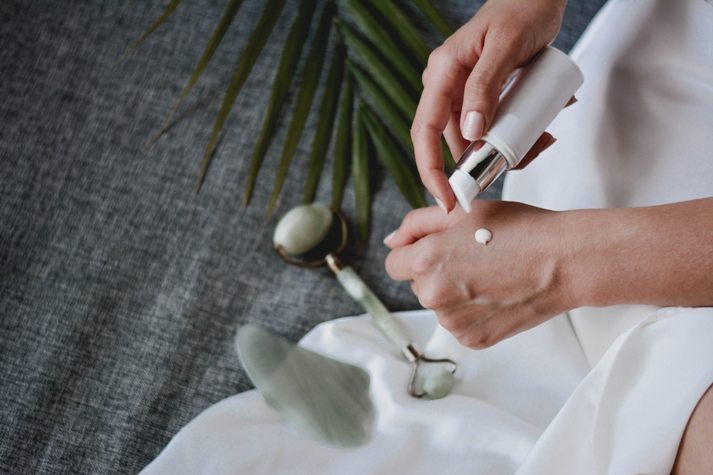From the moment you find out you are having a baby you may be thinking of endless ways on how to take care of that precious being growing inside you.
While the 9 months are full of surprises, it can also be challenging — there are lots to do and prepare for, especially if this is your first pregnancy.
As you bid farewell to your favourite wine after dinner, those perfectly-fit skinny jeans, and even sushi, you know that these may not be the only things you have to part with for the next few months. There are a few ingredients from your everyday skincare routine which also have to be nixed — and for a good reason.
Pregnancy Skincare
Because each type of skin reacts differently, that pregnancy glow may take some women more effort to achieve.
Some women may look effortlessly radiant, while some others have to deal with dry skin, breakouts, or darkening skin. Regardless of whether you look flawless or experience some skin issues, your skin still needs nourishment and care during this special time.
That said, you need to be careful about what you are exposing yourself to, especially if you have sensitive skin. The skin is the largest organ in your body and is quite capable of absorbing everything you put on it. This means you may also be exposing your baby to the ingredients of the skincare products you use. And that’s exactly why you need to be very careful and sure about the products you choose to lather on your skin.
Top Ingredients to Avoid in Pregnancy Skincare
Here’s a list of skincare ingredients you need to avoid in your pregnancy skincare routine:
1. Parabens

Found in almost everything from body lotions to foundations to hair styling gels, parabens are used to preserve makeup or skincare products. They prevent mould or bacteria growth and hence make your cosmetics last longer. However, they have been known as endocrine disruptors and are linked to breast cancers.
What makes them highly potent is the fact that they penetrate the skin very easily and enter your bloodstream and eventually your baby’s. For pregnancy skincare routine make sure to use products that are labelled as paraben-free.
2. Salicylic Acid
An anti-inflammatory agent, salicylic acid is commonly used to treat acne breakouts. The FDA categorizes salicylic acid as a Pregnancy Category C, which means when used in low doses it cannot be harmful.
However, when used in higher concentrations like a chemical peel or orally, then salicylic acid can increase the risk of intracranial bleeding in the fetus. If you have pregnancy acne then you can zap those zits without exposing yourself to toxins by using either witch hazel or lactic acid.
3. Retinoids
A hero ingredient in many women’s skincare products, this vitamin A derivative is known to boost collagen production and help slow down the ageing process and reduce fine lines and wrinkles. Available in both oral and topical forms, it is the main ingredient in many drugs like Amnesteen, Sotret, and the now-discontinued drug Accutane.
Retinoids are known to cause birth defects of the heart and brain as well as physical abnormalities. In fact, it has been documented that prescription retinoids posed a 20% to 35% more risk of congenital defects. Doctors even advise waiting for at least 30 days once you stop the drug before trying to conceive. So, retinoids might be the skincare superstar, but it’s best to steer clear of this one for a while.
4. Phthalates
Phthalates are used as solvents in almost every product around us from cosmetics, skincare products, food packaging to even kids’ toys. But they are known to be endocrine disruptors and have been linked to hormonal dysfunction, infertility, kidney, lung, and liver issues. Various animal studies have proved this and there have even been human trials to support this. However, they are still widely used in cosmetic products.
Skincare products are considered the top source of exposure to phthalates, especially in women. The most common form of phthalates used in skincare and beauty products is diethylphthalate (DEP). With growing awareness, more and more brands are introducing phthalate-free skincare products. So, make sure you check the label!
5. Formaldehyde
Although formaldehyde is nowadays very rarely used as a preservative in beauty products, there are formaldehyde-releasing chemicals that are still widely used in skincare products. According to the Centers for Disease Control and Prevention, formaldehyde is a carcinogen and can increase the risk of infertility in women trying to conceive and chances of miscarriage in pregnant women.
This can be quite scary thoughts, so apart from the term formaldehyde, make sure to check the labels for ingredients such as bronopol, DMDM hydantoin, Diazolidinyl urea, hydroxymethyl glycinate, imidazolidinyl urea, Quaternium-15, and 5-Bromo-5-nitro-1,3-dioxane.
6. Hydroquinone
A skin-lightening agent, hydroquinone is a widely used ingredient in skin care products and prescription drugs to treat skin conditions like melasma and chloasma. Unfortunately, melasma (dark patches) often appears during pregnancy and women do look for products to help reduce the signs. But this is one ingredient you should steer clear of in your pregnancy skincare routine.
Hydroquinone has a high rate of systematic absorption — as much as 45% of it is absorbed into the skin by just topical application and then enters the bloodstream. Animal trials have even linked this ingredient to stillbirths and birth defects. Switch your pregnancy skincare routine to products that include Vitamin C, mulberry extracts, or lactic acid that help lighten the skin naturally.
7. Chemical Sunscreens
Most chemical sunscreens have an ingredient called Oxybenzone and its derivatives. Oxybenzone does a fantastic job of protecting from the UV rays but has potentially serious effects on the health and environment when used long term.
Furthermore, there have even been concerns where chemical sunscreens have been known to disrupt hormones and cause irreversible damage to both the mother and the baby. So, why expose yourself to such toxins when you can easily get that golden glow by bathing in the sun using natural and mineral sunscreens?
8. Fragrance

Fragrances are made up of dozens of harmful chemicals like fillers, derivates, parabens, and more. It is a common ingredient in deodorants, anti-perspiration, lotions, and more. If the label mentions the word ‘fragrance’ or ‘parfum’, then the product might have more than one toxic ingredient that the manufacturer hasn’t mentioned.
These are linked to cancer, asthma, and nervous system problems. Why opt for something so toxic when you are pregnant when you can easily choose fragrance-free skincare products? Nowadays, many manufacturers and brands sell fragrance-free products.
Find Your Glow
When it comes to pregnancy skincare, you’ll want to use products that not only care for your skin but also don’t cause harm to your developing baby.
At this time, there may be a lot of changes going on in your body, and this includes your skin. By knowing which products are safe for you and your baby, you’ll be on your way to that confident, happy pregnancy glow.


